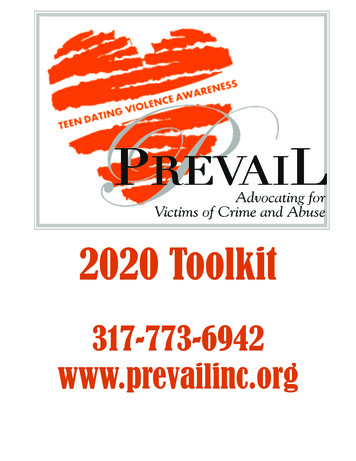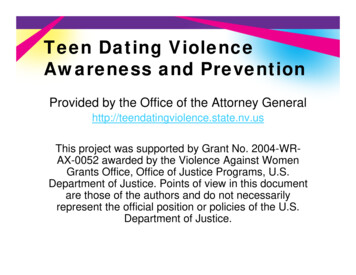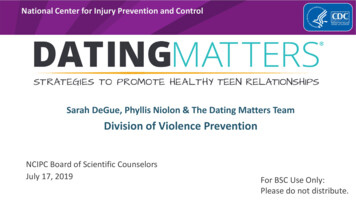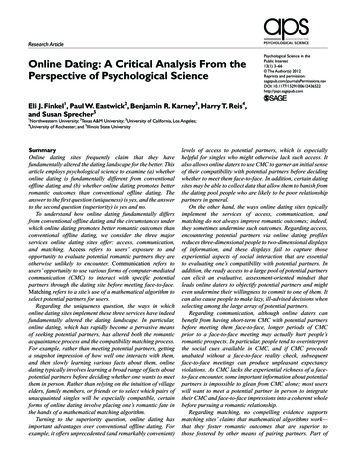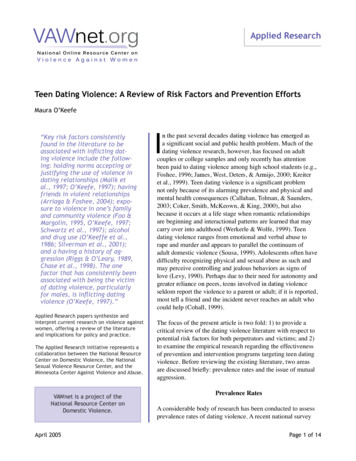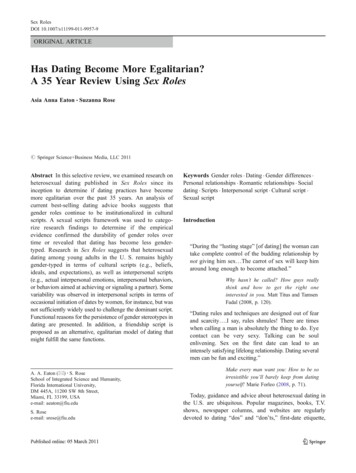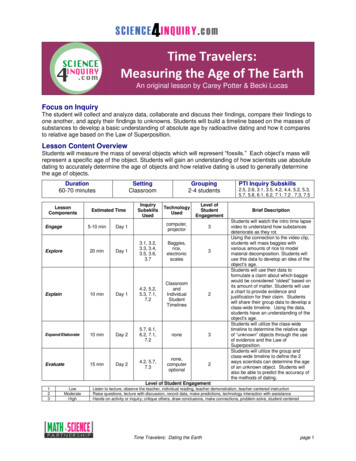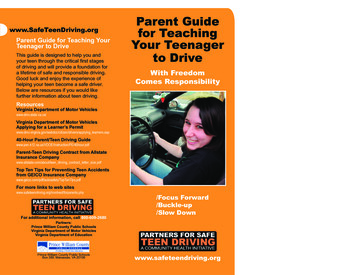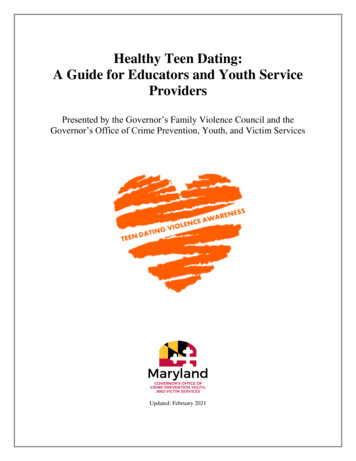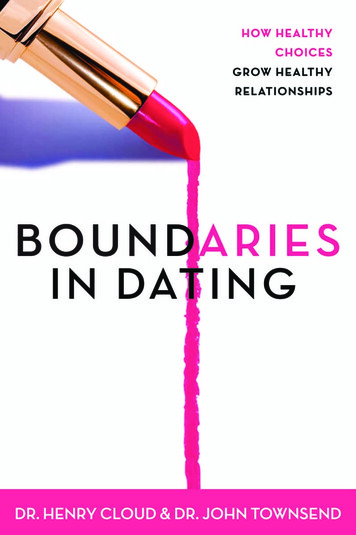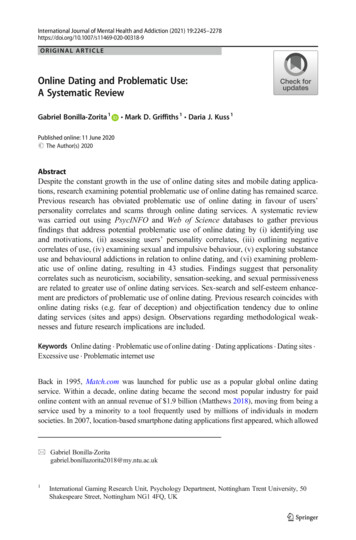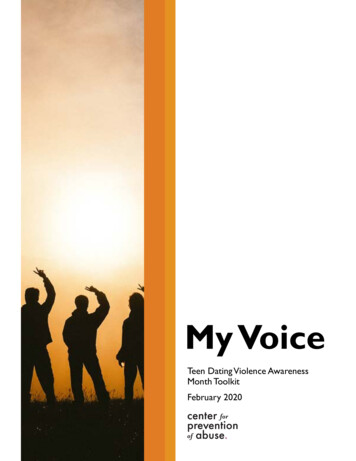
Transcription
Teen Dating Violence AwarenessMonth ToolkitFebruary 2020
contentsWe hope you enjoy exploring the information and activities contained in thisyear’s Teen Dating Violence Awareness Month toolkit, compiled and createdby the Center for Prevention of Abuse.introduction.3curriculum.4praise for CFPA.6infographic.7school-wide initiatives.8sample daily announcements.10consent.11classroom activities & tools.12safety planning.20internet safety.21quiz: self-care.22take action & learn more.24sources.25 PAGE 2
introduction February is National Teen Dating Violence Awareness MonthThe Center for Prevention of Abuse (CFPA), in collaboration with organizations such as Love IsRespect, Let’s Be Real, and Break the Cycle, are uniting communities around the world to educate andraise awareness about teen dating violence, the warning signs of abusive relationships, and what we cando to protect ourselves. Statistics show many teens are impacted by toxic relationships each year.For example, did you know: Nearly 1.5 million high school students experience physical abuse from a dating partner annually. Only 33% of teens who were in a violent relationship ever told about the abuse. One in three adolescents in the U.S. is a victim of either physical, sexual, emotional, or verbal abusefrom a dating partner.Source: www.loveisrespect.orgWith these statistics in mind, CFPA created a packet of resources to help you incorporate teen datingviolence awareness in your school/organization and encourage your staff and students to join themovement to end abuse.In this packet you will find: Information to educate your students and staff about teen dating violence prevention. Activities to engage your students and staff to raise awareness.This year’s theme is “My Voice.” “My Voice” is a reminder that we all know what we want anddeserve in our relationships. When we are in situations where we may feel overwhelmed or facedwith tough situations, we still need to put ourselves and our safety first. This month, we hope youremember to prioritize your own voice. We hope you will participate in some, if not all, of theactivities. We look forward to hearing what you choose to do. Be sure to “like” CFPA on Facebook andpost pictures and/or comments on how your school chose to draw awareness to this very importantissue. You can also get involved by using the hashtag #teenDVmonth.If you have any questions or would like more information about Teen Dating Violence programming,please feel free to contact us at 309.691.0551 or at PreventEd@centerforpreventionofabuse.org.PAGE 3
curriculumMeeting State MandatesThe Center for Prevention of Abuse’s PreventEd: Relationship Abuse curriculum helps schoolsmeet the “Critical Health Problems and Comprehensive Health Education Act,” which is outlinedbelow.Our programming is ideal for freshman health classes, but is appropriate for all high school students,and is presented one time per week for four to eight weeks.Illinois Critical Health Problems and Comprehensive Health Education Act105 ILCS 110/3.10Effective July 1, 2013Sec. 3.10. Policy on teen dating violenceThe school board of each public school district in this State shall adopt a policy that does all of the following: States that teen dating violence is unacceptable and is prohibited and that each student has the right to asafe learning environment. Incorporates age-appropriate education about teen dating violence into new or existing training programsfor students in grades 7 through 12 and school employees.Curriculum DetailsPreventEd: Relationship Abuse 1 ProgrammingThe first series in the PreventEd: Relationship Abuse curriculum through CFPA is comprisedof four cumulative 45-minute lessons that utilize a variety of hands-on activities and discussions toappeal to all learning styles. Students will learn about the four types of sexual harassment and how torespond, the cycle of violence, consent and coercion, and how to be active bystanders to sexual assault.PreventEd: Relationship Abuse 2 ProgrammingThe second set of PreventEd: Relationship Abuse curriculum lessons are offered to those schoolswho have completed the first series and builds on PreventEd: Relationship Abuse 1. In this series,students will broaden their knowledge of domestic violence and human trafficking. In the four lessons,students will learn about emotional abuse (within the cycle of violence), human trafficking, the processof boyfriending, and how to respond when a friend is in a violent relationship. PAGE 4
curriculum PreventEd: Relationship Abuse for Individuals with Disabilities 1 ProgrammingSeries 1 in the PreventEd: Relationship Abuse for Individuals with Disabilities curriculumcontains four lessons. Throughout these lessons, students will be empowered to set boundaries in allrelationships, learn how to identify healthy and unhealthy relationships, and how to be assertive andprotect themselves from abuse. Each 45-minute lesson highlights respect, self-esteem, empathy, andconsent. Hands on activities, audio/visual aids, and discussion appeals to all learning styles and specialneeds with an IQ of 50 .PreventEd: Relationship Abuse for Individuals with Disabilities 2 ProgrammingSeries 2 in the PreventEd: Relationship Abuse for Individuals with Disabilities curriculumfocuses on exploring dynamic personal boundaries across all relationships. Throughout the fourlessons, students learn how boundaries may change, identify “red flags” and dating challenges, anddevelop communication skills and internet safety awareness. Content is designed to appeal to alllearning styles and special needs with an IQ of 50 .To schedule this programming, please contact CFPA’s Director of Prevention Education, LauraKowalske, at lkowalske@centerforpreventionofabuse.org or 309.691.0551 ext. 291.PAGE 5
praise for CFPA“The students always enjoy the program and get a lot out of the presentations.”“My students do well with the interactive activities in these lessons. The students enjoy being part ofthe lesson and not just being talked at.”“Great presentations! Students were engaged and loved the program.”“I learned how to help someone who had been sexually assaulted.”“I learned that there are so many people that want to help others and I liked that they tell us how wecan react to one of these problems.”“I enjoyed everything about the program. I learned a lot of things that are helpful and will usethroughout my life.”“It surprised me that if someone says something, even if it’s not to you, and you hear it, and it makesyou uncomfortable, that it is considered sexual harassment.”“I enjoyed knowing that I can go somewhere to talk about the things that have happened to me if Iwanted to.”“Everything is done on their (the students) level.”“Great program and is presented well! It brings to light information and situations the students maynot have been aware of.”“I really enjoyed the interactive activities. The students were very engaged during them and thematerial was appropriate for the age level and taught in a very appropriate way!”“This is a great program! It’s important and relevant for our freshmen.”“Great information, vital to our youth today! I feel the students learned a great deal from theselessons.”“The program is very beneficial for our students.”“I feel that the students gain a great deal of knowledge and understanding as a result of the lessonstaught.”“Absolutely fantastic! This may help the students in the future or even now!”“This program is our favorite! They do a great job capturing the attention of the students. They reallyenjoy the interactive lessons and videos.” PAGE 6
infographic SourcesLove is ingviolence-statistics/Break the iles/Dating%20Statistics%20Fact%20Sheet Nationalupdated%2012.4.2017.pdfPAGE 7
school-wide initiatives“A Real Valentine’s Day”Encourage students to participate in building a collage using art supplies, magazine images, and foundobjects. On the outside of the collage, put images or items that are symbolic of Valentine’s Day –flowers, candy, cards, etc. As you works toward the middle, place images or items that represent lovethat go beyond the symbols – acts of kindness, respect, caring or being helpful, supporting a partner orfriend, etc.Wear Orange for Love DayWear orange for love on Wednesday, February 12th! Participate in Break the Cycle and Love isRespect’s national movements to support healthy relationships by wearing orange. Snap a pictureand use the hashtags #LoveBetter, #Orange4Love, and #RespectWeek2020 to share your school’sparticipation on your social media accounts.“My Voice Matters”What do partners talk about in a healthy dating relationship? Using the conversation bubble templateon the following page, have students fill out topics or ideas that would be good to discuss with a datingpartner. Answers can include respect, boundaries, independence, self-expression, family, movies, music,shared interests, etc. PAGE 8
school-wide initiatives “My Voice Matters”What do partners talk about in a healthy dating relationship? Using the conversation bubble below, fillout topics or ideas that would be good to discuss with a dating partner. Answers can include respect,boundaries, independence, self-expression, family, movies, music, shared interests, etc.PAGE 9
sample daily announcementsThese announcements can be read to the entire student body during school-wide announcements or readwithin individual classrooms to raise awareness for teen dating violence.Day 1Statistics show 25% of teens are abused or harassed online or through texts by their partners.Everyone deserves respect in their dating relationships. Respectful communication is an important partof keeping your dating relationship healthy. It is okay to set boundaries with your partner about whattypes of communication you are comfortable with and what they share about you on social media.Day 2Dating abuse can take many forms, including digital abuse. If your partner is using technology tointimidate, threaten, stalk, or bully, you can talk to a trusted adult about what you are experiencing.You deserve to feel safe in your relationship, both online and off!Day 3Dating violence can start very early, unfortunately. According to Break the Cycle, more than halfof men (about 54%) and women (about 70%) who have been sexually abused or stalked by a datingpartner first experienced this abuse between the ages of 11 and 24 years old. If you or someone youknow is experiencing abuse of any kind, know that there are people willing to help here at school.Know that you can always reach out to a teacher, social worker, or any adult that you trust.Day 4Healthy dating relationships let partners maintain their independence. If your partner is controllingwhat you do or who you talk to, you may be missing important opportunities in your own life. Youshould be able to maintain your own identity and control your own boundaries. Stay empowered byspeaking up for yourself and talking to a trusted adult if you need to.Day 5Dating violence can go far beyond high school, and it can be difficult to recognize if we don’t talk aboutit now. 57% of college students say that they have difficulty identifying dating abuse, and 58% say thatthey don’t know how to help someone who is experiencing dating abuse. The best thing anyone cando is to be there to support their friends and encourage them to seek help if they are in an unhealthyrelationship. PAGE 10
consent consent is explicit permission or agreement to engage in (sexual) activity. it is given:consent sounds like:consent does not sound like:PAGE 11
classroom activities & toolsTopic: Define the Line(Activity created by NCADV and modified with new scenarios)Source: ule FOUR Middle School Educator Guide- LessonPlans Standards Handouts.pdfGrade: 9–12Time Needed: 20–30 minutesSupplies Needed: Scenarios, “Unhealthy”/ “Abusive” / “Healthy” cards (provided on following pages)Objective: To challenge students to think of the way they view healthy, unhealthy, and abusivebehaviors in relationships as well as their own boundaries.Activity:1. Divide the room into sections of “unhealthy”/ “abusive”/ “healthy” using the cards included in thetoolkit.2. Read the scenarios from the following page and instruct students that when they hear a scenario,they are to decide which section they think that scenario falls into. They should be able to explainwhat made them decide where they stood.After each scenario, ask the following:Would anyone like to share why they chose their spot? Why?Debrief:1. Were there any scenarios that made you feel uncomfortable? Why?2. If something is unhealthy, could it turn into abusive behavior? How?3. Can unhealthy behavior turn into healthy behavior? What would that look like?4. Are there any examples in these scenarios of this happening?5. Are unhealthy/healthy/abusive behaviors always easy for everyone to see?6. Do we all view things the same way?7. Why is it important to think about our behavior in our relationships?8. Is “obsession” with a partner healthy or unhealthy? How and why? PAGE 12
classroom activities & tools Define the Line Scenarios1. Kehlani and Sam have been dating for four months. They each have full access to every single oneof their partner’s social media accounts.2. Travis is upset with Nate because he did not respond to his texts for a whole day and Travis wasworried about him. He decided to talk to Nate about how he felt.3. Amiya is excited to start a new job in the next town over. She is scared to tell Jason because sheknows he gets upset when she is busy after school.4. Paxton is confused about what is happening with Leah. Leah calls him at least eight times a day andgets frustrated when he won’t answer, even when he is at school. She says it is just because shewants to know who he is with and what he is doing.5. Keon and Janelle both play sports. They go to each other’s games and support each other withtheir goals.6. Trey told Rosa that she is super lucky to have him. Though she isn’t the prettiest girl in school, helikes her anyway.7. Neveah and Bekah have been together for a year and get into physical fights constantly. The lasttime they fought, Bekah hit Neveah so hard that it left a bruise.8. Muhammed and Vanessa like to leave encouraging notes in each other’s lockers when they knowtheir partner is having a difficult day.9. Tessa’s partner doesn’t like her hanging out with her friends. Her partner always tells Tessa thather friends are a bad influence and that she is better off without them because she doesn’t needanyone else.10. Daveen’s partner always asks Daveen to text her when she gets home from work after a latenight shift.11. Carmen constantly pressures her partner to take explicit photos of herself. Her partner refuses,but feels if she doesn’t, Carmen will break up with her.PAGE 13
classroom activities & toolsDefine the Line Activity CardsUNHEALTHYABUSIVEHEALTHY PAGE 14
classroom activities & tools Topic: Healthy/Unhealthy Human CollageSource: Grade: 9–12Time Needed: 15–20 minutesSupplies Needed: Human shape cut-outs, various art supplies and found objects (yarn, tape, markers,candy wrappers, magazine pages)Objective: For students to recognize the effects of an ongoing unhealthy relationship.Activity:1. Discuss what trauma could look like. Trauma is a deeply disturbing or distressing experience.2. Using a life-size human cut-out and various materials, have one group of students create a visualrepresentation of a person in a healthy relationship without trauma. The remaining groups willcreate a collage of a person involved in an unhealthy/violent relationship with incidents of trauma(physical, verbal, and/or sexual abuse).3. Remind students that the effects of an ongoing unhealthy/violent relationship are not just physical.Include representations of mental and emotional trauma.4. Have the students write a description to display with their artwork.Debrief:1. How is the human in a healthy relationship different from the ones in an unhealthy relationship?2. What physical effects of violence did you choose to represent in your collage?3. What other non-physical effects of trauma did you include?4. How might some of the effects represented be avoided if the relationship would have endedearlier?5. How can sustained relationship abuse affect someone over time? What would look different?Recommended Books for Project Tie-in: Dreamland, Sarah Dessen (fiction) The Girl Who Fell, S.M. Parker (fiction) Die for You, Amy Fellner Dominy (fiction) In Love and In Danger, Barrie Levy, MSW (nonfiction)PAGE 15
classroom activities & toolsTopic: Romeo and Juliet Relationship Road MapSource: Grade: 9–12Time Needed: 15–20 minutesSupplies Needed: Romeo and Juliet Scenarios (provided)Objective: For students to identify healthy and unhealthy choices in relationships and how thosechoices affect everyone involved.Activity:1. Share this information with the students:“Romeo and Juliet” is often thought to be a romantic story of two young people who defy socialrestrictions to be together. But the choices made by Juliet Capulet (13 years old) and RomeoMontague (15 years old) cause tragedy for themselves and their loved ones. Instead of ending witha happy young couple, six people die: Mercutio (Romeo’s best friend), Thybalt (Juliet’s cousin), Paris(the man Juliet’s parents want her to marry), Romeo, Juliet, and Lady Capulet (Juliet’s mother). Thegoal of this activity is to change the events and change the ending of the story.2. Read the scenarios out loud to the class. For each scenario, ask students to vote for one of thechoices presented. Read the outcome of the winning choice. Then read the other choice(s) toreveal alternative endings.Debrief:1. What healthy characteristics are missing from Romeo and Juliet’s relationship? (Possible answers:Communication, empathy, respect, time to get to know each other, time to grow )2. How do Romeo’s uncontrolled anger and Juliet’s impulsiveness lead to at least three deaths?(Thybalt, Paris, Juliet) - Romeo loses his temper and kills Thybalt, he kills Paris out of jealousy, and when hekills himself Juliet takes her own life.3. How could Juliet’s parents have helped her? (Listening to her, being more inclusive of her, protectingher ) PAGE 16
classroom activities & tools Scenarios:1. Romeo is hanging out with his friends when Thybalt (Juliet’s cousin) and his friends show up. Bothgroups are yelling insults at each other and the conflict escalates. Both sides are ready to fight.Thybalt pulls out a knife. If you are Romeo, what would you do?A. Start fighting. (Thybalt stabs and kills your best friend, Mercutio.)B. Encourage your friends to leave the situation. (You and your friends are unharmed.)2. Romeo and his friends crash a party at Juliet’s house. She “falls in love” with Romeo even thoughshe does not know anything about him. She does not even know his real name. They meet secretlyand she discovers that Romeo is an enemy of her family. If you are Juliet, what would you do?A. Take time to find out more about Romeo and the conflict between your families. (The conflict isvery old, but can be resolved. Your parents might even like him.)B. Walk away from the relationship because you trust your family. (You give up your crush, but youare safe.)C. Secretly marry Romeo the next day. (You just married someone you know nothing about. Yourparents will be furious. Romeo angers easily and is impulsive.There is no safe place and no support foryou to start a life together.)3. Romeo is angry and wants revenge for his friend Mercutio’s death. He sees Thybalt (Juliet’s cousin)on the street. If you are Romeo, what do you do?A. Kill Thybalt to avenge your friend. (You are found guilty of murder and banished from the city. Youhave already married Juliet and will never see her again.)B. Walk away, report your friend’s murder to authorities, and get help. (Thybalt is arrested andbanished. Juliet is upset, but accepts that her cousin was wrong.)4. Juliet’s parents want her to marry Paris. She is already married to Romeo, but has not told herparents. If you are Juliet, what do you do?A. Arrange to fake your own death by drinking “poison” so as to appear dead. (This will resultin four more deaths. Romeo kills Paris at your tomb out of jealousy. Romeo kills himself because hebelieves you are dead. You discover Romeo dead and kill yourself with his dagger. Your mother, LadyCapulet, dies of grief.)B. Finally be honest with your parents or ask other adults for help. (Your parents may punish youand/or help you. They may either try to dissolve your marriage to Romeo, accept it, or release you tojoin him in his banishment. All four of you live.)PAGE 17
classroom activities & toolsTopic: My Voice Says to Me.Grade: 9–12Time Needed: 15–20 minutesSupplies Needed: Quotations (provided)Objective: For students to identify and consider how listening to their instincts and settingboundaries can protect them, and how recognizing self-worth can help people heal.Activity: Have students randomly choose a quotation, read it aloud, and share their thoughts on howit could apply to dating relationships.Debrief:1. Which stage of the relationship do you think the quotation is talking about; beginning, middle, orend?2. Is the relationship healthy or unhealthy?3. How can listening to our instincts protect us or help us deal with an unhealthy relationship? PAGE 18
classroom activities & tools QuotationsPAGE 19
safety planningSafety planning is a tool of empowerment for anyone who is in an unhealthy relationship. In thesesituations, it can be very overwhelming to figure out the best and safest plan of action. Thinking andplanning ahead of time for a specific situation can be very helpful. This plan can be useful during arelationship, if the person is trying to leave a relationship, or after a relationship may have ended. Allaspects of this safety plan can be personalized to fit the situation, even if a person does not ultimatelyleave the relationship.General:School:These are the two ways that I can get to and from school safely that are completely separate frommy partner:1. 2.I can ask this friend ( ) to walk with me between classes.I can spend my lunch and/or free period in these areas or classrooms and know that I am safe andstaff is nearby:1. 2. 3.I can talk to these people at school about what is going on:counselor PAGE 20teachercoachprincipalother:
safety planning Home:I can talk to these people at home about what is going on in my relationship:1. 2.I can ask these people to spend time with me or video chat with me when I’m home alone:1. 2.I can have a code word with my friends and family to let them know if I feel unsafe.My code word:I can use loveisrespect.org at any time to chat with an advocate if I feel uncomfortable talking tosomeone I know.Everyday Life:I feel unsafe at my usual stores. I can ask these people to run my errands with me:1. 2.I can ask these people to keep their cell phones on them if I think I might reach out:1. 2. 3.I know that these places are open late in my community if I need a safe place until someone canpick me up:1. 2.I can call these numbers if I need help: 911 / local domestic violence organization: Center forPrevention of Abuse – 309.691.0551PAGE 21
internet safetyHuman trafficking, specifically underage sex trafficking, is a form of dating violence. Teens are controlled bydating partners who groom them for commercial sex. Here are some warning signs that you can watch out forwhen talking to someone online:“Find me on Kik/Skype.” or “Let’s go private.”Leaving the comments section or public thread and talking on a private messaging app gives people a chance tolearn more personal information about you or to talk to you knowing that they’re safe from being “overheard.”“Are you alone?”Someone may be asking if you’re alone to send you content they wouldn’t want your parents or other peopleseeing or to get you to share more pictures or information. If someone you don’t know is specifically seekingout ways to talk to you in private, be extra careful. It’s okay to end a conversation or block a user that makesyou feel uncomfortable.“Do you have a pic?”There are some pictures that seem harmless to share with someone you trust, but once you share a photowith someone, you can’t always control who else they share it with. Pictures might also communicate moreinformation that you intend to. For example, a photo of you and your friends at your volleyball tournament cantell someone where you go to school.“You seem sad. Tell me what’s bothering you.”We all enjoy having someone offer a listening ear. While it can be helpful for you to talk about what you’regoing through, it also gives the other person a chance to learn about your thoughts and private life. It’s possiblethat the person is asking personal, seemingly caring questions to find out ways to take advantage of you.“I know a way you can earn money fast.”Anyone offering you a way to make money fast should probably not be trusted. It’s a good idea to avoid gettingcaught up in dealing with money with someone you don’t know, especially if it includes sending photos ofyourself or talking on a webcam, even if it sounds like what they’re asking you to do is no big deal. Talk with atrusted adult before you ever accept employment or money from someone you do not know.“What’s your phone number?”Not only does giving someone your phone number create an opportunity for them to build more trust and afalse sense of intimacy, a phone number also reveals your location, and often times, even your home address.“I love you.”Everyone enjoys hearing the words “I love you,” but sometimes people use this to make it feel safe to do thingsthat you might not otherwise do.“If you don’t do what I ask, I’ll show everyone the pictures you’ve sent me.”As someone learns more and more about you, they might threaten to reveal a private photo or tell yourparents about something you’ve shared if you don’t do what they ask. Even if you’re afraid of what they mightthink, tell a parent, teacher, or another adult you trust right away if someone is trying to intimidate or threatenyou. It’s better to put a stop to threats right away than to hope that they’ll stop after you just do this one thing. PAGE 22
quiz: self-care Part of listening to ourselves and knowing what we deserve is making sure that we are taking care ofourselves, which is not always easy!Source: 019/08/Self-Care-Quiz.pdfDirections: Answer based on how often you do each of the following statements. Make sure to checkthe boxes to record your responses. At the end, you’ll find out how to score your answers.I DO THIS:tlyuenFreqllyionaasOcclyRareerNevADN1. I eat regularly (breakfast, lunch, dinner, or after fasting).2. I exercise or do a fun physical activity if I’m feeling stressed.3. I take time to slow down and take care of myself when I’m sick (i.e.get medical care, take some time off work, or other engagementsto rest).4. I get enough sleep.5. I make time to be with my thoughts and self-reflect.6. I take time to express my thoughts or feelings, or have a creativeoutlet (i.e. writing your thoughts in a journal, expressive art, etc.).7. I say no to extra responsibilities when my plate is already full.8. I spend time with people who make me happy.9. I love myself and give myself positive affirmations.10. I allow myself to show emotions.11. I spend time with my pets or in spaces in which I feel comfortable.12. I make time to do important things like creating a budget orstudying.13. I ask for help if I need it.14. I spend time with people I care about who care about me too(friends or family).15. I unplug from harmful social media.16. I make quiet time for myself to complete necessary tasks.17. I take time to ch
Dating abuse can take many forms, including digital abuse. If your partner is using technology to intimidate, threaten, stalk, or bully, you can talk to a trusted adult about what you are experiencing. You deserve to feel safe in your relationship, both online and off! Day 3 Dati
